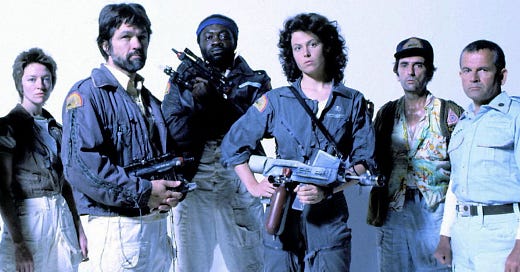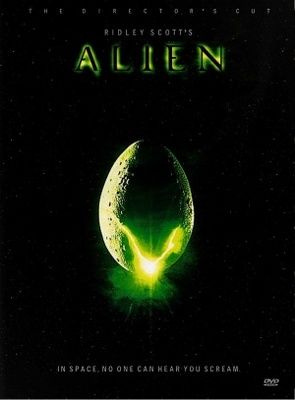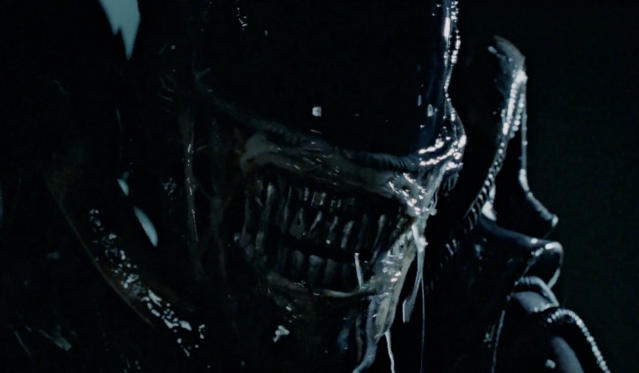Alien has stood the test of time better than most films ever made. Whether it’s the tense direction, the beautifully horrific production design, the incredible cast, or just the terror that is the xenomorph, Alien has established itself as a stalworth in both the horror and science fiction landscapes. One element that often gets overlooked is the subtext of the film. While the rape allegory is quite evident (with the penis-like xenomorph both penetrating the man and the forceful “birth” scene being just two examples), the text I’ll be discussing today is the relation between the film and the fears of the blue-collar working class.
While this may not be the most apparent connection upon first viewing, the evidence is clear as to the intentions of director Ridley Scott and writer Dan O’Bannon. From the first conversation, the characters have the audience is aware of their social standings and motivations. And as the film progresses and intrigue is replaced by horror, the thematic resonance of the crushing weight of capitalism upon the working class becomes one of the strongest stances the film takes.
Even before a line is spoken we can actually see that Alien is separating itself from the horror films of the time. Following only one year after the release of Halloween, horror was quickly pivoting into what would be the decade-defining genre of the slasher. While the argument could be made that Alien is a slasher with a sci-fi flair, the main distinguishing factor from the genre is the cast. Slashers are the playground for killers of teenagers, for retribution against sex and drugs and lives not yet lived. But the cast of Alien are late twenties to late forties, people well into middle age and generations apart from the usually killer fodder. These are people with careers and families and homes, people with things to lose other than their lives. When these characters are killed it’s not simply another jumpscare for the audience but an entire unseen life being taken.
Combine this with the second line of the film (following the prophetic “you look dead, Brett”) in which Parker and Brett ask about bonuses being increased upon their return to Earth. We are immediately shown the class division even within the ship, in which the engineers (Brett and Parker) who work in the belly of the ship are set to make less than the commanding ranks. This is quickly brushed off by the commanding officer, but the pressure of pay is still at play when, after discovering they have been woken early from stasis in order to respond to a distress signal, the only reason they decide to respond to the signal is that their wages would be forfeited if the crew did not. Capitalism is the driving factor for all events to follow, and the desperation of the crew to make their money leads only to their demise.
This is not even to mention the secondary antagonist of the film (and arguably the primary antagonist of the entire franchise), the Weyland-Yutani corporation. It is revealed part-way through the film that the science officer Ash was an android, and that his orders were to bring back the xenomorph at all costs. While it is speculated that the company was going to use the creature to develop weapons (throughout the film it is shown that Weyland-Yutani is a massive corporation with its hands in many different sectors, another hint at their more nefarious, all-encompassing nature) it is never stated outright what the company was planning. It’s actually the ambiguity that makes it more horrific. The lives of the working force are so disposable to the corporation that they are willing to sacrifice an entire crew of people for an opportunity, not even a guarantee. The crew dies not for the profit of the company, but for the theory of profit.
It is this hypothetical profit, this imagined product, that leads to the crew answering the distress signal, to Ash overriding Ripley’s orders, to the death of Kane and the birth of the xenomorph. And the betrayal of Ash plays into the idea of the expendability of the working class. They have already been infiltrated, replaced, by something that would openly betray their best interests for the interest of the company. Emotion, life, has been factored out of the equation. People are an expense, not a soul. While Ash is the smaller representation of the rise of the machines and the reach of the company, it is the ship itself that fully encompasses the horrible capabilities of nameless suits.
The Nostromo, a commercial space tug with cargo that is never revealed to us, is monstrous in its own rights. Flying through the vastness of space the ship is a tremendous sight, yet inside the crew and the audience alike are treated to claustrophobic conditions and grotesque interiors that recall the internal organs of a dying animal. The ship represents the corporation, a massive unknowable thing that imprisons our protagonists (though they initially never see it like this). The crew has spent years on this ship yet its corridors are unfamiliar and dangerous to them while at the same time comforting and hiding the xenomorph. Their ultimate demise is brought about by the vessel, as without its hideous design the monster would not have been so able to hide and sneak and destroy.
The xenomorph is at this point an extension of the ship, and thus the corporation which the ship represents. Throughout the film the alien blends into corridors and corners of the ship, unseen and unknown to those who considered the ship a safe space. Side by side it is hard to tell what is flesh and what is ship, as the two combine with hardly a flaw. And it is through this combination of flesh and machine, of alien and ship and corporation, we are finally able to fully see the fear that lies within the working class; fear of replacement, fear of exploitation, and fear of being obsolete.
What is the xenomorph if not for a superior creature, able to outsmart and out-maneuver the working class? A creature designed to fit into the image of the faceless company, and that the faceless company has already deemed more valuable than their blue-collar employees. What is the xenomorph if not, much like the grinding gears of late-stage capitalism, a creature that kills from the inside out? A creature that kills the hope and soul before devouring the flesh. The real terror upon the Nostromo is what a corporation is willing to do in order to eke out a profit.
Or it’s just a spooky alien. You decide!
Thank you for subscribing. Your support means the world.







